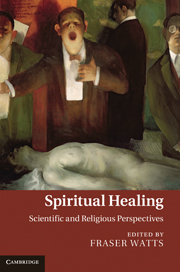Book contents
- Frontmatter
- Contents
- List of figures
- List of contributors
- Preface
- 1 Conceptual issues in spiritual healing
- 2 The historical Jesus and healing: Jesus' miracles in psychosocial context
- 3 The theology of spiritual healing
- 4 Healing the spirit: mystical Judaism, religious texts and medicine
- 5 Conceptualizations of spiritual healing: Christian and secular
- 6 The psychodynamics of spiritual healing and the power of mother kissing it better
- 7 Spiritual healing in the context of the human need for safeness, connectedness and warmth: a biopsychosocial approach
- 8 Modelling the biomedical role of spirituality through breast cancer research
- 9 Spirituality and health: assessing the evidence
- 10 Relating spiritual healing and science: some critical reflections
- 11 Concluding integration
- Bibliography
- Index
6 - The psychodynamics of spiritual healing and the power of mother kissing it better
Published online by Cambridge University Press: 04 February 2011
- Frontmatter
- Contents
- List of figures
- List of contributors
- Preface
- 1 Conceptual issues in spiritual healing
- 2 The historical Jesus and healing: Jesus' miracles in psychosocial context
- 3 The theology of spiritual healing
- 4 Healing the spirit: mystical Judaism, religious texts and medicine
- 5 Conceptualizations of spiritual healing: Christian and secular
- 6 The psychodynamics of spiritual healing and the power of mother kissing it better
- 7 Spiritual healing in the context of the human need for safeness, connectedness and warmth: a biopsychosocial approach
- 8 Modelling the biomedical role of spirituality through breast cancer research
- 9 Spirituality and health: assessing the evidence
- 10 Relating spiritual healing and science: some critical reflections
- 11 Concluding integration
- Bibliography
- Index
Summary
The role of psychoanalytic interpretation of almost anything to do with religion has a complex and difficult history, with arguments pulling in different directions and conclusions often preceding those arguments. While it is not the place of this essay to rehearse this well-trodden path of debate, it is important to remember that impartiality is a rare, if not impossible, stance.
Both spiritual and religious healing are complex areas, as this volume shows, and are open to a variety of interpretations. Some claim dramatic cures of terminal or chronic conditions while others prefer to talk of being healed and reconciled to their health issues in a more quiet and organic way. Not for them the spectacular dramatic intervening of a creator God, rather a more quiet and prayerful anointing with a still small voice of calm. Space needs to be created in our thinking to move us beyond the removal of symptoms or distress. In effect, understanding what the term ‘healing’ means requires a far broader terminology.
It is not my intention here to be reductionist or to explode the myth of spiritual healing. I intend to use case material from my own work and ongoing research in this area. Permission has been given to use this material, but the intention is that no one should be recognized from any of these cases. I have suitably disguised, amalgamated or generalized the material in line with current psychoanalytic practice to maintain the anonymity of those involved.
- Type
- Chapter
- Information
- Spiritual HealingScientific and Religious Perspectives, pp. 90 - 111Publisher: Cambridge University PressPrint publication year: 2011



